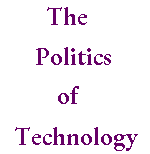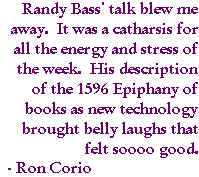

Both the Newark and the Richmond institutes offered whole group sessions, featuring individual, team, and panel presentations on pedagogy, technology, philosophy, and politics, each of which is reviewed in this section. All of the sessions were open to discussion with the participants, either during or immediately after the presenters' talks. Frequently, the whole group discussions at Richmond would shift the focus away from the initial presenter, and back toward a central question or issue raised by a participant, which, in turn, often caused leaders to modify their own presentations to better meet the audiences' needs. Interaction like this among both groups is another of the recurring themes of both institutes.

The creator of ENFI, Trent Batson discussed entering collaborative writing spaces with students as shared creators of texts, using technological assistance to redistribute authority over writing in the classroom. Judy Williamson added that technology also opens the classroom beyond artificial audience constructs, allowing students access to a global audience of computer users. Although this was one of the earliest presentations at both institutes, participants are still forming new ideas and pedagogical approaches based on this discussion.

This session provided each of the Richmond leaders with a few minutes to discuss political issues attached to our technology-related endeavors. Speakers covered topics ranging from the politics of partnerships within English departments, among resistant faculty, to partnerships with secondary schools, administrators, and computer/network staff. A special guest to the panel works for Virginia Commonwealth University's computer support services, and offered his views on the politics of faculty/support staff partnerships. Panel presenters also highlighted possible difficulties that students may have as a result of our initiatives, especially access and equality issues.

The Epiphany Model for incorporating technological change in the writing classroom, the STEPs program outlines a detailed, 5 semester plan for implementing theoretically sound, computer assistance to mainstream faculty. During this session, the audience contributed suggestions for STEPs revision, including adding classroom observations as a first semester activity. Although it is still evolving as a model for change, several Richmond participants have already put the STEPs model into action.

By the time this whole group session occurred in Richmond, participants had bonded with one another to form a community, having already worked together in small groups and in concurrent sessions. Participants shared personal tales of success (and failure) with technology, including notable stories from two audience members: one professor who described his enthusiasm for starting his technology-assisted class as "running full-speed ahead," but who encountered such technical problems with his server and applications that he "ran straight into a brick wall--at full speed;" and a second who shared her own experience with the use of email during her "pilot semester" as having been lukewarm, but during her subsequent treatment for and confinement with cancer, as having been the warmest, most touching support mechanism she could have encountered.

In a whole group panel presentation, audience members listened to teacher "confessions" for which CMC may offer solutions, or, at least, alleviations. One leader, who confessed to being "a big mouth" noted that CMC allows students to listen to each other instead of to him, and another leader, who confessed to "needing to feel needed" by students explained that CMC provides her students with independence, to get along without her. Audience members then shared their own confessions, and the whole group of participants worked on brainstorming ways that computers could help us to solve problems in the classroom.

Randy Bass of Georgetown University delivered the keynote speech at the Richmond Institute and he used his imaginary or "virtual" slides to dissect the current historical moment for computer-assisted instruction. Virtual slides are actually a blank screen, where the audience is asked to imagine what the speaker describes; the central thrust of Bass' talk focused on this moment as the only one in history where we can "see" the computer as a teaching tool, before it disappears into our everyday landscape like the book or the television.
| Formats | Themes | Leaders | People |